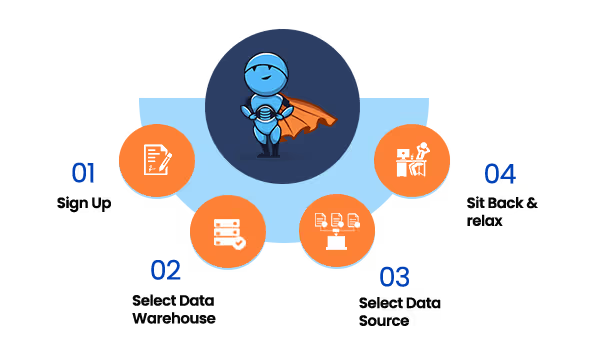In today’s digital time, the volume of data to be analyzed is increasing day by day, new data sources are growing and the results have to be generated instantly for deeper analysis. But to do that means analyzing millions of interactions at speed and applying sophisticated algorithms to large datasets. Storing and manipulating your MySQL data with cloud data services like Google BigQuery makes the whole process easier and more cost-effective, provided that you can get your data in, efficiently. With up-to-date analysis-ready data in BigQuery, lets your teams focus proactively on understanding customers and improving your product.In this article, we have highlighted the overview of MySQL and BigQuery and we will walk you through two approaches to integrating MySQL to BigQuery as well as the advantages and disadvantages of both processes.
Why integrate MySQL into BigQuery
It’s hard to analyze your data when they are spread between various applications. A major reason to integrate your MySQL data into Google BigQuery is the ability to join multiple data sources for valuable analysis. MySQL BigQuery integration allows businesses to get up-to-date information about operations and react without a delay and provide solutions for smart monitoring of infrastructure performance. Consolidating MySQL data with data from disparate sources into one common destination enables quick data analysis for business insights and ensures consistent data quality, which is absolutely crucial for reliable business insights.
MySQL Overview
MySQL is a database management system that allows you to manage relational databases. It is open-source software backed by Oracle. It means you can use MySQL without paying a dime. MySQL is integral to many of the most popular software stacks for building and maintaining everything from customer-facing web applications to powerful, data-driven B2B services. It is quicker than other databases, so it can work well even with a large data set. MySQL now includes deep support for distributed applications and inclusion in most cloud data platforms.
BigQuery Overview
Google BigQuery is a serverless data warehousing platform where you can query and process vast amounts of data. Google BigQuery is a powerful Big Data analytics platform that enables super-fast SQL queries against append-only tables using the processing power of Google’s infrastructure. The best part about it is that one can run multiple queries in a matter of seconds even if the datasets are relatively large. BigQuery is a powerful tool for business intelligence and it offers analytics capabilities to organizations of all sizes.
How to replicate MySQL to BigQuery
Here are two approaches you can use to replicate MySQL data to BigQuery. This will allow you to evaluate the pros and cons of both and choose the one that best suits your requirement.
Build your own data pipeline
This process needs a lot of experience and consumes a lot of time and manpower. The chances of errors are more due to multiple integrated steps one after the other. You need to extract data using MySQL APIs & then connect it properly with the BigQuery data warehouse. This whole process to build a custom data pipeline is cumbersome.
Use Daton to integrate MySQL and BigQuery
Integrating MySQL and BigQuery with Daton is the fastest & easiest way to save your time and effort. Leveraging an eCommerce data pipeline like Daton significantly simplifies and accelerates the time it takes to build automated reporting.Configuring data replication on Daton only takes a few minutes and a few clicks. Your analysts do not have to write any code or manage any infrastructure, yet you can get access to MySQL data in a few hours.Daton’s simple and easy-to-use interface allows analysts and developers to use UI elements to configure data replication from MySQL data into BigQuery.Daton takes care of:
- Authentication
- Rate limits
- Sampling
- Historical data load
- Incremental data load
- Table creation, deletion, reload
- Refreshing access tokens
- Notifications
and many more important functions for data analysts to focus on analysis rather than worrying about the data migration.
Steps to integrate MySQL with Daton

- Sign in to Daton
- Select MySQL from the integrations page
- Provide Integration Name, Replication Frequency, and History. Integration name would be used in creating tables for the integration and cannot be changed later
- You will be redirected to MySQL login for authorizing Daton to extract data periodically
- Post successful authentication, you will be prompted to choose from the list of available MySQL accounts
- Select required tables from the available list of tables
- Then select all required fields for each table
- Submit the integration
For more information, visit MySQL Connector.
Sign up for a trial of Daton Today!
Here are more reasons to explore Daton for MySQL to BigQuery Integration
- Faster integration – MySQl to BigQuery is one of the integrations Daton can handle very conveniently and seamlessly. By following a few steps you can easily connect MySQL to BigQuery.
- Low Effort & Zero Maintenance – Daton automatically takes care of all the data replication processes and infrastructure once you sign up for a Daton account and configure the data sources. No need to manage infrastructure or write manual code.
- Data consistency guarantee and an incredibly friendly customer support team ensure you can leave the data engineering to Daton and focus on analysis and insights!
- Enterprise-grade data pipeline at an unbeatable price to help every business become data-driven. Get started with a single integration today for just $10 and scale up as your data needs grow.
- Robust Scheduling Options – This allows you to schedule jobs based on their requirements using a simple configuration step.
- Support for all major cloud data warehouses including Google BigQuery, Snowflake, Amazon Redshift, Oracle Autonomous Data Warehouse, PostgreSQL, and more.
- Flexible loading options allow you to optimize data loading behavior to maximize storage utilization and ease of querying.
- Enterprise-grade encryption gives your peace of mind
- Support for 100+ data sources – In addition to MySQL, Daton can extract data from a varied range of sources such as Sales and Marketing applications, Databases, Analytics platforms, Payment platforms, and much more.
For all sources, check our data connectors page.By replicating your MySQL data to BigQuery, you are free from all the hassle of retrieving data from relational databases by writing SQL queries.
Other Articles by Saras Analytics,







.avif)






































































































